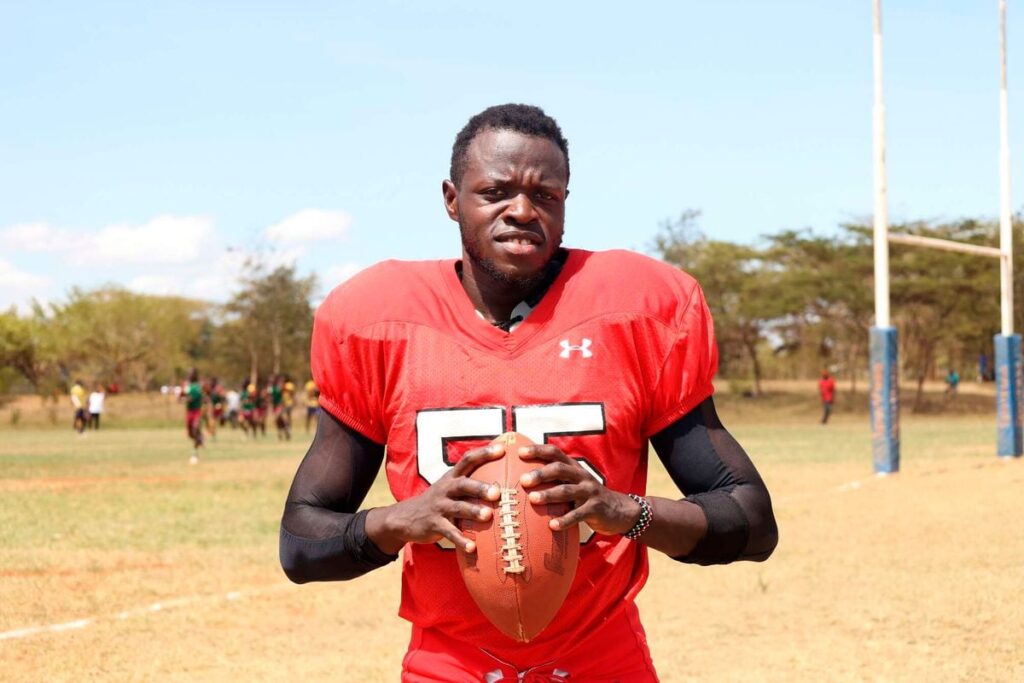Edwin Otieno Osmo (30) is an architect who plays and coaches American football. He plays as a wide receiver, but also plays quarterback and defensive back in both tackle and flag football.
American football is not very popular in Kenya, how did you come to play this sport?
I played rugby, and when I joined the University of Nairobi (UoN), some students played American football. We decided to try something new. In my first year, I just watched the games from the stands, but in my second year, in January 2015, I started playing seriously with the recommendation of a friend.
There are several Kenyans in the professional American Football League (NFL). Did they give you any inspiration?
Even before I started playing the sport, I had heard about Kenyan players like Daniel Adongo (Indianapolis Colts), Helva Matunguru (New York Jets), and Reece Odhiambo (Seattle Seahawks), and since then I have been playing the game. I started watching games. Although I had never met them, I was very inspired by the fact that they were Kenyans.
How would you describe your journey so far as an American football player?
There were many ups and downs. When I started, there were only three teams in the country: the University of Nairobi, Jomo Kenyatta University of Agriculture and Technology (JKUAT) and his team Umoja Chiefs.
In 2015, a coach named Dan Eck came to us from America. He saw the potential in our team and specifically said that if I had been born in America, my talent would have made it to the NFL. He tried to point me to other methods that might work. He encouraged me to go to a university in the US and get his master's degree to hone my skills.
Did your dream come true?
Eck left in 2016. We stayed in touch and he and I were scheduled to graduate in 2017, but a massive strike on campus derailed our plans and I and he didn't graduate until 2018. By that time I was old enough to be eligible to play in the National Collegiate Athletic Association (NCAA), I was 24 years old and was close to being eligible, but I got locked out.
I decided to look into other alternatives. I had heard about a program called NFL Undiscovered. I was sending them videos of my work. I persisted in 2017 and at some point they noticed me and asked me to develop my skills. I did, but that didn't work either. I tried knocking on a few more doors, but with no success, I shifted my focus to teaching. That's what I'm doing now.
How else do you stay involved in sports?
I participated in a pilot coaching program to train children at Mirema Primary School. I'm still a player, but I've transitioned into coaching. I think if I get a chance to play professionally, I can extend my playing career. But right now, he's focused on playing less and coaching more. I'm also looking forward to the 2028 Los Angeles Olympics, as there will be a new type of American football called flag football. This is basically a non-contact version of American football, and I'm learning how to coach this.
What challenges have you seen in American football?
Having good training facilities on campus was a challenge. In order to play, I had to create my own hurdles. Also, American football equipment is expensive and not easily available here in Kenya, so we relied on donations. Recruiting and retaining talent within the team was also a challenge. Since it is a new sport, there are only small tournaments held locally. Most of the international matches we tried to organize never materialized. So people participate in sports, but then they drop out and have to start recruiting again. Sometimes, when I try to recruit people, I get asked how far I can go in this sport, which is not popular in Kenya. My vision was to play professionally and I haven't given up yet. I may not be able to play professionally, but I want to stay in the game and help other players grow. The sport has the potential to grow, especially in flag football, which is inexpensive.
Returning to rugby, who are your role models in rugby? Do you regret quitting?
Kenya Sevens star Collins Injera was my role model. I was comparing myself to him in terms of his physique. He wasn't very big, but he had a strong will. After he graduated high school and spent a year without playing rugby, he felt like he was being left behind. He didn't feel like he could make up for lost time. He had planned to play rugby when he entered university, but fate had other plans. I met some great friends, discovered that I was good at American football, and found a coach who believed in me and made me a captain, so I decided to pursue a new sport. Some of my friends said I should have continued playing rugby. They told me you wouldn't get far in American football. I don't regret my decision.
What are your best and worst moments in both tackling and flag football?
In tackle football, he received 1 touchdown and ran for 2 touchdowns in the second leg of Kenya vs. Uganda (Utarii Ground). We won 34-22. In flag football, he threw four touchdowns and had a pick-six against the JKUAT Sparrows, leading UoN Nyati to his 69-12 victory. My worst moment in tackle was when we went goalless against UoN Nyati and JKUAT Sparrows in the first game of the first-ever tackle football tournament in 2018. JKUAT won. In flag football, he suffered a high ankle sprain during training in October 2017, which limited his activities for three months.



